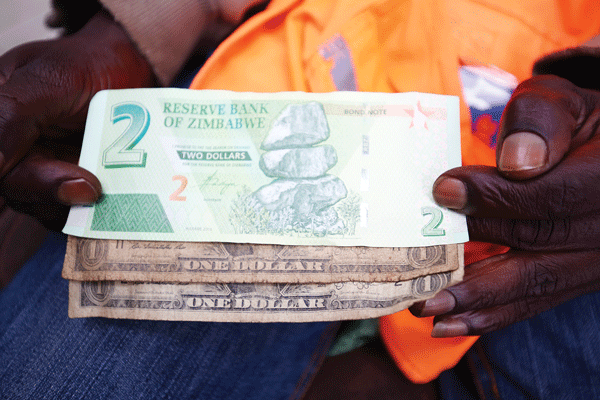
guest column: Jameson Dapi
FORTUNE knocks at least once on every man’s door, so goes the centuries-old proverb. In plain simple English, the axiom means that every individual gets one good chance in a lifetime, which they can either miss or capitalise on.
On February 20, 2019, Reserve Bank of Zimbabwe (RBZ) governor John Mangudya (pictured)challenged hordes of illegal foreign currency (forex) dealers operating across the country to vacate street corners where they are playing cat-and-mouse games with law enforcement agents, and formalise their trade by applying for licences to operate bureaux de change.
The RBZ governor subsequently issued guidelines for those who are interested in investing in bureaux de change in terms of Section 7 (1) of the Exchange Control (Authorised Dealers with Limited Authority) Order, Statutory Instrument 104 of 2015.
Among the requirements, applicants must comply with a minimum capital requirement of US$15 000 or its equivalent; demonstrate capacity to install a robust computer system capable of processing and recording all transactions across their operating units and pay the applicable licence fees.
Every bureaux de change shall keep a daily aggregate float limit of not more than US$20 000 limit of cash in the vault per branch with any excess amounts to be deposited with an authorised dealer designated for currency sales and purchases.
On the face of it, the conditions precedent to the issuance of a licence seem restrictive and beyond what an average illegal forex dealer at the Road Port in Harare or ‘World Bank’ in Bulawayo could afford.
But once looked at closely, there is really nothing out of the ordinary about the guidelines that seek to safeguard the integrity of the financial system so that it doesn’t become a haven for money laundering activities with dire consequences to the entire economy if not adequately regulated.
- Chamisa under fire over US$120K donation
- Mavhunga puts DeMbare into Chibuku quarterfinals
- Pension funds bet on Cabora Bassa oilfields
- Councils defy govt fire tender directive
Keep Reading
To conform to the requirements, what is required is for those interested in operating bureaux de change to think outside the box, discard individualism by pulling resources together in order to raise the minimum capital threshold and be ready to operate in formalised environs as opposed to playing dangerous hide-and-seek games with the police.
There are also opportunities available for capital raising through the banks, venture capital and some such initiatives open to the youths and women through the Empowerment Bank and the Zimbabwe Women’s Microfinance Bank, respectively.
Allowing this opportunity presented by Mangudya to go begging might come at a heavy price for illegal forex traders who should never forget what happened in 2009 when the dollarization of the local economy rendered them jobless.
Signs that the end to their free reign is nigh are clearly written on the wall and even the blind can see them. By floating the exchange rate and allowing the interbank to operate as a market place for forex, the Reserve Bank of Zimbabwe (RBZ) has planted a kiss of death on the illegal parallel market, which had emerged in circumstances where official rates were fixed and chronically overvalued.
Why should someone risk 10 years in prison for buying or selling forex on the parallel market when they can get the same from the comfort of their retail bank’s banking hall?
With the controls gone, that pulling factor which was drawing individuals and corporates to resort to unofficial channels will not last, which could happen sooner rather than later if the RBZ secures additional hard cash to support the interbank market and allow even critical imports to source their forex from the same market.
This happened between 1946-1971 when under the Bretton Woods monetary order, most countries imposed controls since its system of fixed exchange rates and monetary independence could only be maintained at the expense of capital mobility.
Consequently, most countries had black markets to some degree.
After the collapse of Bretton Woods in 1971, many countries still retained controls to navigate the financial chaos unleashed by the oil shocks, commodity price swings and the early 1980s recession and debt crises.
But with the move towards economic liberalisation in the 1980s and 1990s, capital controls have been the exception rather than the rule and black markets have mostly withered away although they still flourish in certain countries, including Nigeria and Iran, as well as Venezuela.
Instead of waiting for the inevitable to happen, like in 2009, forex dealers should grab Mangudya’s offer with both hands.
A bureau de change is a very profitable business venture that one can engage in, as long as you are good with numbers, you can run this business.
People exchange currencies every day. Those entering into a country from another country would need to change their currency into that of their destination country.
And since virtually all countries welcome visitors every day, there is a constant demand for currency exchange.
There is also a steady demand for currency exchange services by business owners and entrepreneurs, especially those into importation and exportation of goods.
By definition, a bureau de change is a retail foreign exchange dealer carrying out the business of personal travel allowance, business travel allowance, medical and school fees, and can also carry out inward and outward money transfers.
All over the world, there are bureau de change operators and they play different roles.
For instance, the primary role of bureau de change globally is to ensure forex availability to the critical retail sector of the forex market in terms of supply, to bridge the gap between the official and the parallel market exchange rate.
The operators have even gone beyond ensuring rate convergence and providing liquidity, to the achievement of the major policy of their central banks, which is exchange rate stability.
So by formalising their activities, forex dealers might just be on their way to playing a meaningful role in the country’s economy.











